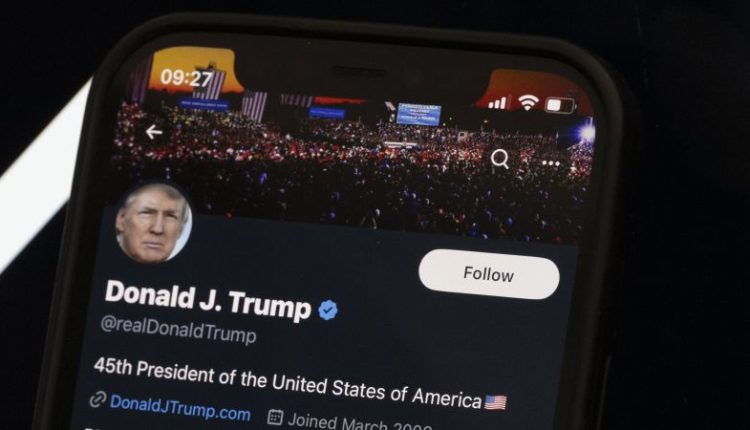Twitter turned over at least 32 direct messages from former President Donald Trump’s account – @realDonaldTrump – to special counsel Jack Smith earlier this year as part of the federal election subversion investigation, according to newly unsealed court filings.
In seeking the messages, prosecutors specifically argued that Trump posed a risk of tampering with evidence.
The unsealed filings shed new light on the extent of the special counsel investigation into Trump’s efforts to overturn his 2020 election loss. Much of that conduct played out publicly, including on Trump’s Twitter account, where he promoted bogus claims of mass fraud and urged government officials to disrupt certification of the results.
But investigators were also able to access private records associated with the account, though it is not clear exactly how the messages have informed the investigation.
The investigators – writing to the DC Circuit Court of Appeals to defend a non-disclosure order they obtained about the warrant for @realDonaldTrump – outlined how Trump had pressured state and federal officials after the 2020 election, retaliated against people who didn’t do what he said, was paying legal fees of witnesses in the probe and disparaged the special counsel office’s top prosecutor publicly.
“This pattern of obstructive conduct amply supports the district court’s conclusion that the former President presents a significant risk of tampering with evidence, seeking to influence or intimidate potential witnesses, and ‘otherwise seriously jeopardizing’ the Government’s ongoing investigations,” the special counsel’s office wrote.
Prosecutors also noted alleged obstruction by Trump in his other criminal matter, the classified documents probe. At the time of the prosecutors’ court argument to the appeals court, Trump wasn’t charged in federal court in either case. He has since pleaded not guilty to charges stemming from the investigations into election interference and his handling of national security documents. Both cases include obstruction-related charges.
“More recently, the former President has taken several steps to undermine or otherwise influence the investigation into the potential mishandling of classified information following the end of his presidency, including publicizing the existence of the Mar-a-Lago Warrant,” the prosecutors said in the appeals court filing.
“The former President’s obstructive efforts continue unabated with respect to this investigation here, in which he has determined to pay the legal fees of potential witnesses against him and repeatedly disparaged the lead prosecutor on his Truth Social platform” prosecutors wrote.
The detail of what prosecutors obtained with a search warrant issued to the social media platform was revealed in a brief submitted under seal in April to the US Circuit Court of Appeals in Washington, DC.
Twitter – now known as “X” – was appealing a judge’s ruling that sanctioned the company for its delay in turning over the records from Trump’s account.
The company resisted producing the records because a court-approved order directed it not disclose to Trump details about the warrant. It also raised concerns about the possibility that the former president might want to assert executive privilege over some of the materials on his account.
“Indeed, the materials Twitter produced to the Government included only 32 direct-message items, constituting a minuscule proportion of the total production,” the prosecutors wrote in the newly unsealed brief.
“As such, Twitter sought to delay compliance with the entirety of the Warrant based on the speculative possibility that a tiny fraction of the total production could, implausibly, contain instances when the President sought to use the direct-messaging function to carry out sensitive and confidential deliberations with trusted advisors within the Executive Branch,” prosecutors added.
The DC Circuit unsealed the brief Friday alongside other previously secret filings in the court dispute. Another court filing unsealed Friday said that the warrant sought information from October 2020 through January 2021.
The warrant sought “[a]ll content, records, and other information relating to communications sent from or received by the SUBJECT ACCOUNT from October 2020 to January 2021, including . .. The content of all direct messages sent from, received by, stored in draft form in, or otherwise associated with the SUBJECT ACCOUNT.” It also sought “All other content, records, and other information relating to all other interactions between the SUBJECT ACCOUNT and other Twitter users from October 2020 to January 2021.”
This story has been updated with additional details.
Read the full article here

